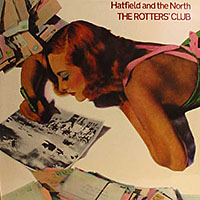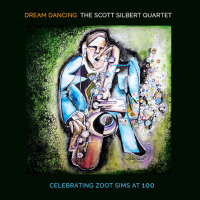Home » Search Center » Results: Hatfield and the North
Results for "Hatfield and the North"
Jeff Denson Quartet: Concentric Circles

by Jerome Wilson
The immediate standout feature of Jeff Denson's group is that he uses a bassoon as the reed instrument. That gives an interesting twist to the quartet's sound. Denson's compositions are a free-ranging mix of fast-paced progressive jazz and pretty ballads. The nimble, woody tone of Paul Hanson's bassoon gives an intellectual feel to the ...
Steven Wilson: Hand. Cannot. Erase.

by John Kelman
Sometimes you never can tell. When British singer, songwriter and multi-instrumentalist Steven Wilson released the old school progressive rock record The Raven That Refused to Sing (And Other Stories) (Kscope, 2013), who knew that it would not only turn out to be his best-selling album since walking away from Porcupine Tree to begin an increasingly successful ...
Hatfield and The North: The Rotter's Club

by John Kelman
Hatfield and The North The Rotter's Club Esoteric Recordings 2009 (1975) Today's Rediscovery is a bit of a lie, because Hatfield and the North's second album, The Rotter's Club, is rarely far from some kind of media player for long. A group that never received the acclaim it deserved back ...
Graham Bond: Wading in Murky Waters

by Duncan Heining
Organist and saxophonist Graham Bond was the most important and influential musical pioneer to emerge from British jazz in the 1960s. High praise indeed, but in his case it is warranted. His legacy might be defined less by the music he recorded and more by the impact he had on subsequent generations of musicians. However, that ...
Steven Wilson: The Raven That Refused to Sing (And Other Stories) [Deluxe Edition]
![Read "Steven Wilson: The Raven That Refused to Sing (And Other Stories) [Deluxe Edition]" reviewed by John Kelman](https://s3.amazonaws.com/allaboutjazz/coverart/large/stevenwilson_theraventhatrefusedtosingandotherstories.jpg)
by John Kelman
Even though Porcupine Tree began as a solo project for a young Steven Wilson in the late 1980s--and despite the British singer/guitarist/keyboardist remaining its primary composer through to The Incident (Kscope, 2009) and the recent live record from that tour, Octane Twisted (Kscope, 2012)--it's been some time since the group was truly representative of his aspirations, ...
Steven Wilson: Luck's What You Make It

by John Kelman
There was a time when progressive rock really meant what its name suggested: progressive music, music that pushed the boundaries of what rock music was, often by integrating elements of classical music and jazz into the mix. Milestone groups ranging from better-knowns like Yes, Genesis, King Crimson, Jethro Tull, Gentle Giant and Van der Graaf Generator ...
Cuneiform Records: Growing Progressive Music for 27 Years

by Mark Redlefsen
Twenty seven years is a long time for a niche progressive music label such as Cuneiform Records not just to survive, but to remain inventive and, in the best sense, ambitious. Steve Feigenbaum founded Cuneiform back in 1984, and with his wife, Joyce, runs it from Silver Springs, Maryland. Hosting bands such as Universe Zero, digging ...
Steven Wilson: Grace for Drowning

by John Kelman
Not that he wasn't already busy when, amidst being a driving force behind No-Man, Incredible Expanding Mindfuck and Porcupine Tree, singer/multi-instrumentalist Steven Wilson released his first proper solo recording, Insurgentes (Kscope, 2009), but the past two years have been even more hectic. His outstanding work bringing the King Crimson catalogue into the 21st century with revealing ...
MoonJune Records: A Decade of Progressive Rock Documentation

by Mark Redlefsen
On a moon of this past June, appropriately enough, Leonardo Pavkovic, owner of the progressive jazz label MoonJune Records, gave All About Jazz an interview at the label's office in Union Square, New York City. The name MoonJune Records, which Pavkovic started back in 2001, is taken from the title of a song, “Moon In June," ...
Piccho dal Pozzo: A_Live

by John Kelman
In the continually expanding world of progressive rock--an expansion facilitated through global communities created via the internet over the last decade-and-a-half--it's increasingly common to find groups garnering far more (and, often, well-deserved) attention than they did back in their time. Italy's Picchio dal Pozzo only released two albums back in the day--Picchio dal Pozzo (Grog, 1976) ...

















